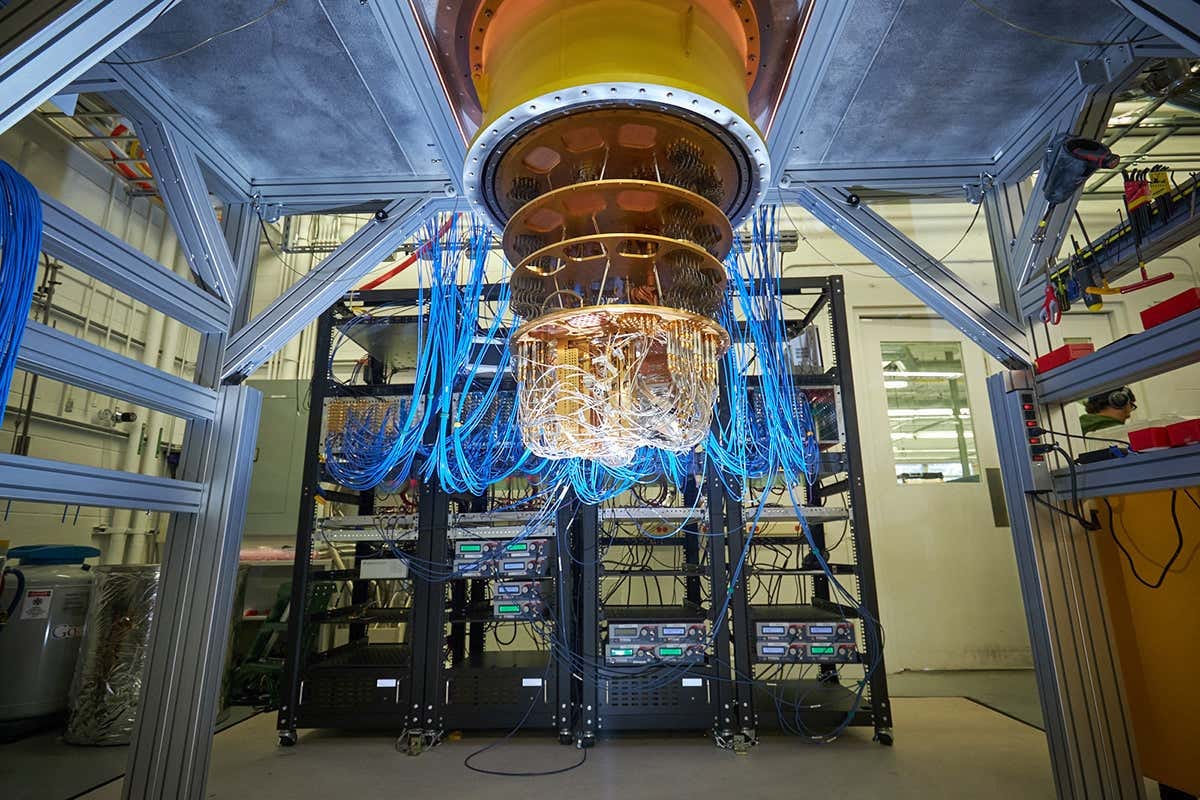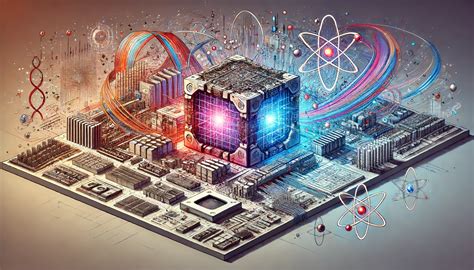The landscape of computing is on the cusp of an unprecedented transformation, poised to redefine the very foundations of data processing and problem-solving. At the forefront of this revolution lies quantum computing, a technology so profoundly different from classical computing that it promises to usher in a new era of capabilities, pushing beyond the limits of even the most powerful supercomputers imaginable today. For businesses, researchers, and tech enthusiasts alike, understanding the implications of quantum computing—especially its potential to trigger a server paradigm shift—is not just an academic exercise; it’s a critical foresight for strategic planning and staying ahead in the digital race. This groundbreaking technology, with its implications for fields from medicine to finance, makes for highly valuable content, driving strong SEO and potentially high Google AdSense revenue as more people seek to grasp its future impact. This comprehensive article will delve deep into the principles of quantum computing, explore how it differs fundamentally from classical computation, and meticulously detail the profound ways it could redefine server infrastructure, data centers, and the entire digital ecosystem.
Demystifying Quantum Computing: Beyond Bits
To grasp the magnitude of the coming server paradigm shift, we must first understand what sets quantum computing apart. Unlike classical computers, which store information as bits representing either a 0 or a 1, quantum computers leverage the bizarre and counter-intuitive principles of quantum mechanics.
A. Qubits: The Quantum Advantage
The fundamental unit of information in a quantum computer is the qubit. What makes a qubit revolutionary is its ability to exist in more than just two states:
- Superposition: A qubit can represent a 0, a 1, or a combination of both simultaneously. Imagine a coin spinning in the air; it’s neither heads nor tails until it lands. A qubit in superposition is akin to that spinning coin, existing in multiple states at once. This inherent parallelism allows quantum computers to process vast amounts of information simultaneously, exponentially increasing their computational power with each additional qubit.
- Entanglement: This is perhaps the most perplexing yet powerful quantum phenomenon. When two or more qubits become “entangled,” their fates become intrinsically linked, regardless of the physical distance separating them. A measurement performed on one entangled qubit instantly influences the state of the other(s). This correlation allows quantum computers to perform incredibly complex calculations by linking qubits, enabling them to solve problems that would be intractable for classical machines.
B. Quantum Gates: Manipulating the States
Just as classical computers use logic gates (like AND, OR, NOT) to manipulate bits, quantum computers employ quantum gates to control the states of qubits. These operations maintain the delicate superposition and entanglement, allowing algorithms to explore numerous possibilities simultaneously. Unlike classical gates, quantum gates are reversible, meaning information is not lost during computation.
C. Coherence and Decoherence: The Fragile State
Quantum states are incredibly fragile. They exist in a state of coherence where superposition and entanglement are maintained. However, interaction with the environment (even slight vibrations or temperature fluctuations) can cause decoherence, where the quantum state collapses, and the qubits revert to classical bits (0 or 1). Maintaining coherence for long enough to perform complex computations is one of the biggest engineering challenges in quantum computing, requiring incredibly cold temperatures (close to absolute zero) and isolated environments.
Classical vs. Quantum: A Fundamental Divide
The distinction between classical and quantum computing is not merely one of scale or speed; it’s a fundamental difference in how information is processed.
A. Classical Computing: Bits and Determinism
Classical computers operate on binary bits, processing information sequentially. They excel at tasks that require brute force calculation, repetitive operations, and deterministic outcomes.
- Deterministic Operations: For a given input, a classical computer will always produce the same output.
- Sequential Processing: Calculations are performed one step at a time.
- Linear Scaling: Adding more transistors or processors increases power linearly or polynomially.
- Applications: Everyday tasks, data management, web Browse, scientific simulations up to a certain complexity.
B. Quantum Computing: Probability and Parallelism
Quantum computers leverage probabilistic outcomes and inherent parallelism to tackle problems beyond classical reach.
- Probabilistic Outcomes: Due to superposition, a quantum computation results in a probability distribution of possible outcomes. Running the computation multiple times is often necessary to get a confident answer.
- Massive Parallelism: A system of N qubits can represent 2^N states simultaneously, allowing for the exploration of all these possibilities in parallel. This exponential scaling is what gives quantum computers their immense theoretical power.
- Unique Algorithms: Quantum computers require entirely new algorithms (e.g., Shor’s algorithm for factoring large numbers, Grover’s algorithm for searching unsorted databases) to harness their unique capabilities.
- Applications (Future): Drug discovery, materials science, financial modeling (optimization), complex logistics, artificial intelligence (specifically machine learning), cryptography.
The Impending Server Paradigm Shift
The advent of practical quantum computing is poised to trigger a profound server paradigm shift, reshaping how we conceptualize, build, and utilize computing infrastructure. This isn’t just an upgrade; it’s a re-imagination of the server’s role in the digital ecosystem.
A. The Hybrid Computing Model: Quantum as an Accelerator
Initially, quantum computers won’t replace classical servers entirely. Instead, we’ll see a hybrid computing model emerge as the dominant paradigm.
- Specialized Quantum Accelerators: Quantum processors will function as highly specialized co-processors or accelerators, akin to how Graphics Processing Units (GPUs) augment Central Processing Units (CPUs) today for parallel tasks like AI or graphics rendering.
- Orchestration by Classical Servers: Complex problems will be decomposed. The classical server will handle the bulk of the data management, I/O, and general computation, offloading only the most computationally intensive, intractable sub-problems to the quantum processing unit (QPU).
- Cloud-Based Quantum Access: Most organizations won’t own quantum computers due to their extreme cost and infrastructure demands. Access will predominantly be provided via cloud platforms, where users submit quantum circuits to remote QPUs managed by providers like IBM, Google, or Microsoft. This means a server farm might soon include quantum as a service (QaaS) connections.
- Quantum Middleware: New layers of software (middleware) will be developed to seamlessly integrate classical and quantum workflows, handling data conversion, job scheduling, and result interpretation between the two distinct computing architectures.
B. Data Center Transformation: From Racks to Quantum Vaults
The physical infrastructure of data centers will undergo a radical transformation to accommodate quantum hardware.
- Cryogenic Cooling Requirements: Superconducting qubits (a leading quantum architecture) require temperatures close to absolute zero (millikelvin range), necessitating specialized, large-scale cryogenic refrigeration systems within data centers. These “quantum vaults” will be vastly different from current server racks.
- Shielding and Isolation: Quantum computers are extremely sensitive to electromagnetic interference and vibrations. Data centers will need advanced shielding and isolation techniques to protect QPUs, leading to specialized, isolated environments within the facility.
- Hybrid Rack Designs: Expect to see novel rack designs that integrate classical compute resources (for orchestration) in close proximity to the cryogenic systems housing the QPUs, optimizing data transfer speeds.
- Energy Consumption Shifts: While QPUs themselves consume relatively little power at very low temperatures, the associated cooling systems consume significant energy. This will shift energy management strategies within data centers.
C. Security and Cryptography: A Double-Edged Sword
Quantum computing presents both a grave threat and a powerful solution in the realm of cybersecurity.
- Breaking Current Encryption: Shor’s algorithm poses an existential threat to widely used public-key encryption standards like RSA and ECC, which underpin secure communications, financial transactions, and internet security. This necessitates a rapid shift to post-quantum cryptography (PQC).
- Quantum-Resistant Algorithms: Research is frantically underway to develop and standardize cryptographic algorithms that are resistant to attacks from quantum computers. Servers will need to implement these new algorithms, requiring significant software and hardware updates.
- Quantum-Enhanced Security: Conversely, quantum mechanics could also offer enhanced security solutions. Quantum key distribution (QKD), for instance, uses quantum properties to create inherently secure encryption keys that are theoretically unhackable. Servers could integrate QKD for ultra-secure communications.
- Threat Landscape Evolution: The very nature of cyber threats will evolve. Defenders will need quantum-aware security protocols, while malicious actors might leverage quantum capabilities for new forms of attack. Server security protocols will need to be re-evaluated from the ground up.
D. Software Development Evolution: New Paradigms and Skills
The server paradigm shift extends deep into the software stack, demanding new programming models and developer skill sets.
- Quantum Programming Languages: New languages and frameworks (e.g., Qiskit for IBM Quantum, Cirq for Google, Microsoft’s Q#) are emerging, distinct from traditional programming.
- Quantum Algorithm Development: Developing efficient quantum algorithms is a highly specialized field requiring expertise in quantum mechanics and computer science.
- Quantum-Aware Middleware: Engineers will need to develop and manage software layers that translate classical data into quantum states, manage quantum jobs, and interpret probabilistic results back for classical applications.
- Integrated Development Environments (IDEs): Expect to see IDEs that seamlessly support both classical and quantum code development, allowing developers to build sophisticated hybrid applications.
- Upskilling and Reskilling: A significant need for upskilling current IT professionals and training a new generation of quantum developers will arise, transforming the tech workforce.
E. Data Processing and Storage: New Architectures
Quantum computing’s ability to process vast search spaces will also influence data architecture.
- Quantum-Accelerated Databases: While classical databases will still store most data, quantum algorithms could be used to perform ultra-fast searches, optimizations, or pattern recognition within massive, complex datasets (e.g., medical records, financial markets).
- Quantum Data Formats: As quantum computers become more prevalent, new ways of encoding and handling quantum data might emerge, requiring specialized storage and retrieval mechanisms.
- Edge Quantum Computing: In the distant future, small-scale quantum processors might even reside at the edge of networks (e.g., in specialized sensors or devices) to perform immediate, localized quantum computations, reducing reliance on centralized cloud resources for certain tasks.
- Data Compression and Analysis: Quantum algorithms could enable incredibly efficient data compression or unlock new methods for analyzing complex, unstructured data that are currently impossible with classical techniques.
Industries Transformed by the Quantum Server Shift
The implications of this server paradigm shift span nearly every sector, with some industries poised for truly disruptive advancements.
A. Pharmaceuticals and Materials Science
Quantum chemistry simulations can accurately model molecular interactions, accelerating drug discovery and materials innovation.
- Drug Discovery: Simulating molecular behavior at the quantum level can identify new drug candidates, predict their efficacy, and optimize their interactions with biological targets, drastically reducing R&D time and cost.
- New Materials: Designing materials with novel properties (e.g., superconductors, highly efficient catalysts, lightweight alloys) by simulating their quantum behavior, opening doors for breakthroughs in energy, manufacturing, and electronics.
- Personalized Medicine: Quantum analysis of complex genomic and proteomic data could lead to highly personalized treatment plans.
B. Financial Services
Quantum computing offers unparalleled capabilities for complex optimization and risk analysis.
- Portfolio Optimization: Solving highly complex optimization problems to construct optimal investment portfolios, considering vast numbers of variables and constraints.
- Fraud Detection: Identifying sophisticated patterns of fraud in massive transaction datasets with higher accuracy and speed than classical methods.
- Risk Modeling: More accurate and rapid assessment of financial risks, including credit risk, market risk, and operational risk.
- Algorithmic Trading: Developing more sophisticated trading algorithms that can analyze vast market data and execute trades at unprecedented speeds.
C. Logistics and Optimization
Quantum’s strength in optimization problems can revolutionize complex logistical challenges.
- Supply Chain Optimization: Optimizing global supply chains for efficiency, cost reduction, and resilience, considering countless variables like demand fluctuations, transportation costs, and resource availability.
- Route Planning: Solving the “traveling salesman problem” for massive numbers of stops, revolutionizing delivery services, flight paths, and public transport networks.
- Resource Allocation: Optimizing the allocation of scarce resources in various industries, from energy grids to manufacturing lines.
D. Artificial Intelligence and Machine Learning
Quantum computing can enhance AI beyond current capabilities.
- Quantum Machine Learning: Developing quantum algorithms for machine learning that can process larger datasets or identify more complex patterns than classical ML, leading to breakthroughs in areas like image recognition, natural language processing, and predictive analytics.
- Neural Network Optimization: Training neural networks more efficiently and effectively.
- Data Anomaly Detection: Quickly identifying unusual patterns in vast datasets for cybersecurity or scientific discovery.
E. Cybersecurity and Defense
As mentioned, this is a dual-use technology, both threat and opportunity.
- Cryptographic Evolution: The race to implement post-quantum cryptography on critical infrastructure, including servers, is already underway.
- Enhanced Threat Detection: Quantum-accelerated AI for identifying subtle cyber threats in real-time within massive network traffic.
- Secure Communications: Implementing quantum key distribution for government and military communications, requiring new server hardware and protocols.
Challenges on the Path to the Quantum Server Future

While the vision of a quantum-powered future is compelling, significant challenges remain before the full server paradigm shift materializes.
A. Hardware Scalability and Error Correction
Current quantum computers are noisy and have limited qubits.
- Number of Qubits: Building machines with thousands or millions of stable, interconnected qubits is a monumental engineering feat.
- Error Rates (Noise): Quantum systems are prone to errors (noise) due to decoherence. Developing robust quantum error correction (QEC) techniques is crucial, but these require many physical qubits to create a single “logical” qubit, escalating hardware requirements.
- Cryogenic Engineering: Scaling up cryogenics to support larger quantum processors remains a significant hurdle.
B. Software and Algorithm Development
The theoretical understanding of quantum algorithms is still nascent.
- Finding Quantum Advantage: Identifying and developing commercially viable quantum algorithms that truly offer a significant speedup over classical methods for real-world problems is an ongoing challenge.
- Programming Complexity: Quantum programming is highly complex, requiring a deep understanding of quantum mechanics. User-friendly interfaces and abstraction layers are needed.
- Debugging and Verification: Debugging quantum programs is inherently difficult due to the probabilistic nature of quantum states.
C. Integration with Classical Infrastructure
Seamlessly integrating quantum accelerators with existing classical server infrastructure is a complex undertaking.
- Interoperability Standards: Developing common standards for quantum-classical communication, data formats, and job scheduling.
- Network Latency: The physical distance between classical servers and quantum processors (especially in the cloud) introduces latency that needs to be minimized.
- Workload Management: Efficiently distributing computational tasks between classical and quantum resources will be a complex scheduling problem.
D. Economic and Societal Impact
The widespread adoption of quantum computing will bring significant economic and societal shifts.
- High Costs: Initial quantum hardware and development will remain extremely expensive, limiting access to large corporations and research institutions.
- Job Market Transformation: The demand for quantum engineers, programmers, and specialists will soar, while certain classical computing roles may evolve or diminish.
- Ethical Considerations: The power of quantum computing raises ethical questions regarding data privacy, algorithmic bias, and potential misuse.
The Journey to a Quantum-Accelerated World
The server paradigm shift driven by quantum computing is not an overnight event but a gradual, iterative process. We are currently in the NISQ era (Noisy Intermediate-Scale Quantum), where quantum computers have tens to a few hundred qubits but lack full error correction. This period is crucial for developing algorithms and identifying “killer applications” where quantum computers can demonstrate a clear advantage.
As quantum hardware matures and error correction becomes more robust, we will move towards fault-tolerant quantum computing, where the true revolutionary potential will be unlocked. This journey will involve continuous innovation in hardware design, significant breakthroughs in quantum algorithm development, and the establishment of robust, secure, and scalable hybrid classical-quantum cloud infrastructures.
Governments, academic institutions, and leading technology companies are investing heavily in this field, recognizing its immense strategic importance. Collaborations and open-source initiatives are accelerating progress, building the foundations for a future where quantum capabilities are seamlessly integrated into our digital fabric, transforming how servers operate and how we tackle humanity’s most complex challenges. The server, as we know it, will evolve from a purely silicon-based workhorse to a sophisticated orchestrator of both classical and quantum computational power, heralding an era of unprecedented problem-solving.








